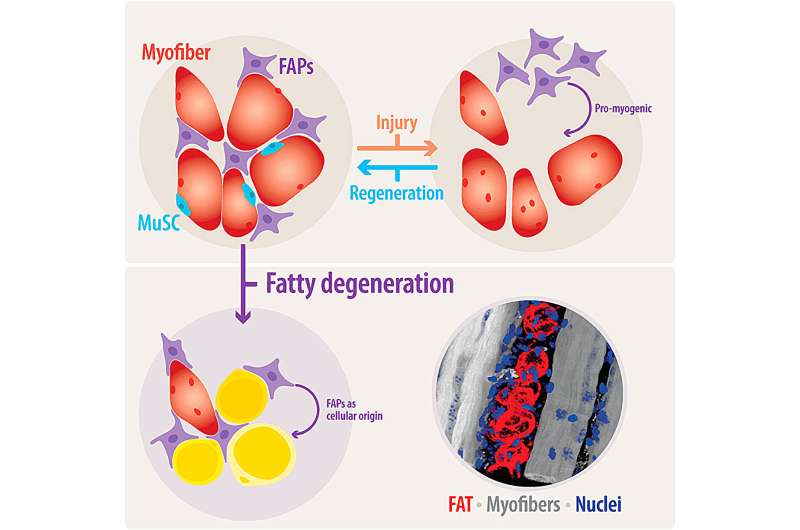This article has been reviewed according to Science X's editorial process and policies. Editors have highlighted the following attributes while ensuring the content's credibility:
fact-checked
proofread
New study reveals how fat in muscles could increase risk of cardiometabolic disease and unhealthy aging

Scientists at the Victor Chang Cardiac Research Institute in Australia are calling for greater awareness of a fat deposit located in skeletal muscles.
A new study explores how an accumulation of this hidden fat called intermuscular adipose tissue (IMAT) and its associated cells can drive a range of diseases, including muscle loss, type 2 diabetes, and cardiovascular disease.
Lead author Dr. Osvaldo Contreras, of the Sydney-based Victor Chang Cardiac Research Institute, says the dangers of IMAT had been overlooked for too long.
"Everyone knows the dangers of belly fat, and how a build-up of fat in your cardiac arteries can cause a heart attack. But there is a type of fat that barely anyone has heard of, despite it being linked to a whole range of life-threatening diseases," says Dr. Contreras.
"IMAT is crucial for maintaining muscle function, but in common with other fats, too much of it can be a bad thing. Excessive IMAT deposition can trigger muscle atrophy, diminished functional capacity, inflammation, insulin resistance, cardiovascular diseases, metabolic disorders, and even accelerate the aging process."
The new study outlines the implications of IMAT, a form of fat located between muscle fibers and muscle groups. Skeletal muscles make up around 30–40% of adult body mass and play a pivotal role in regulating metabolism, breathing, body temperature, and physical activity.
The study's authors—comprised of a team of international experts in skeletal muscle, metabolism, adipogenesis, and exercise—outline how an accumulation of cells known as fibro-adipogenic progenitors leads to an increase in IMAT, which can result in nerve-to-muscle connection being damaged. It is this chronic damage and disease-modifying factors which can pave the way for a spectrum of diseases including muscle atrophy, type 2 diabetes, and cardiovascular disease.
A build-up of IMAT can be caused by several factors including sex-related hormone levels, acute and chronic injuries and an unhealthy lifestyle.
There is no simple way to currently test the levels of IMAT in the muscles. But it is hoped that advancements in molecular and imaging assessments and targeted biopsies will lead to better diagnostic tools in the future.
Until then, people are being urged to closely watch their weight and maintain a healthy lifestyle.
The authors of the study published in Molecular Aspects of Medicine say an over accumulation of IMAT can both be prevented and reversed through exercise and a healthy diet.
"While the importance of exercise is often emphasized, its critical role in combating frailty and a myriad of diseases is often overlooked," adds Dr. Flores-Opazo, of the Institute of Health Sciences, Universidad de O'Higgins, Chile and the study's first author.
"Regular exercise, including weight training, is imperative for maintaining muscle health and resilience."
In addition, the study highlights the potential of drugs like metformin in addressing IMAT accumulation and mitigating associated tissue damage.
"We are hopeful that a deeper understanding of IMAT biology and better testing will pave the way for novel therapeutic strategies targeting various debilitating conditions. We believe this study represents a remarkable step forward in our understanding of human physiology and pathophysiology," Dr. Contreras adds.
More information: Marcelo Flores-Opazo et al, Fibro-adipogenic progenitors in physiological adipogenesis and intermuscular adipose tissue remodeling, Molecular Aspects of Medicine (2024). DOI: 10.1016/j.mam.2024.101277



















